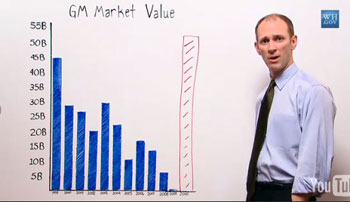(lead article)
Capitalists ‘recover’
on backs of workers
White House lauds GM auto bailout

|
|
In video posted on White House Web site, President Barack Obama’s economic advisor Austan Goolsbee defends government bailout of GM, claiming it saved “American jobs.”
|
BY SETH GALINSKY
The White House and the big-business press claim the United States is in an economic recovery. Asserting that the billion-dollar bailouts are beginning to bear fruit, the White House has even posted a video on its Web site titled “Rebirth of the American Auto Industry.”
The bondholders, banks, and owners of industry are experiencing a recovery in their profits for the time being. But these are built on ever shakier economic foundations and at the expense of working people.
A case in point is General Motors, which launched a large stock offering November 18, putting 400 million plus shares on the market at more than $33 a pop. In a variation on “What’s good for GM is good for America,” Linda Killian, portfolio manager at Renaissance Capital, crowed, “It’s good for the stock market. It’s good for the equities market… . So it’s good for all of us.”
The U.S. Treasury Department, which took control of nearly 61 percent of GM stock in 2009 as part of the $50 billion bailout, sold half of its stock in conjunction with the current offering.
As part of the bailout, General Motors closed 14 out of 47 plants, handed over responsibility for the employee health-care plan to the United Auto Workers union, reduced wages and benefits of autoworkers, and sped up the assembly line. Prior to the government takeover and GM’s bankruptcy filing, the company had already cut its hourly workforce from 113,000 in 2006 to 61,000 in 2008. By February 2010 it was down to 46,000.
In the White House video, Austan Goolsbee, chairman of President Barack Obama’s Council of Economic Advisers, says that Obama’s instructions to implement drastic cost-cutting turned GM around. “Everyone had to sacrifice,” Goolsbee said, to succeed in “saving American jobs.”
“Everyone” means unionized workers at GM. New hires now earn about $14 an hour, half what veteran workers make. GM threatened to close down Nexteer Automotive, a parts plant in Saginaw, Michigan, after workers rejected a wage freeze and a $12-an-hour starting pay for new hires. Union officials repeated the vote; on the second round, workers approved the concessions.
While GM continues to press workers to cut wages and benefits, the company reported profits three quarters in a row, including more than $1.9 billion in the most recent quarter alone.
Rising trade disputes add more uncertainty to the profits of U.S. capitalists. Some 72 percent of GM cars are sold outside the United States, many in China.
General Motors is one of many companies bolstering profits by pushing through two-tier wage systems, speedup, and benefit cuts.
Chrysler; Delphi auto parts; Caterpillar; Kohler, a kitchen and bath company; and Mercury Marine are among major manufacturers that have put two-tier systems in place, often coupled with indefinite wage freezes.
A new contract at Harley-Davidson includes a wage freeze, lower pay for new hires, expanded hiring of temporary workers, and fewer benefits. “This is absolutely a surrender for labor,” union official Mike Masik Sr. told the New York Times.
Accelerating recovery
Bloomberg news service published a report November 18 titled “Economic Data Show U.S. Recovery Accelerating.” The article stated, “Gains in incomes and stock prices are helping households repair tattered finances more than a year into the economic recovery that began in June 2009.”
In spite of the upbeat tone, the figures it cites confirm that capitalists are not taking profits they get by wringing more from workers and investing to expand production, plants, or machinery. To the degree that they are investing, it is largely directed to stocks, bonds, and other ponzi schemes, based on the illusion that somehow money by itself can generate more wealth.
The working class is paying the price. According to the U.S. Department of Labor, the number of people out of work for a year or more grew from 645,000 in 2007 to 4.5 million in 2010, comprising a record high of almost 31 percent of those officially unemployed.
Two million workers, who have been receiving unemployment benefits for more than 26 weeks, could see their benefits run out by the end of December. Congress is not expected to reach an agreement extending the payments until after the current benefits expire.
Workers who have collected for 99 weeks are not eligible for more extensions. As many as 91,000 workers hit that mark each week and are cut from the benefit rolls.
Related articles:
Ireland gov’t prepares major austerity moves
| 


